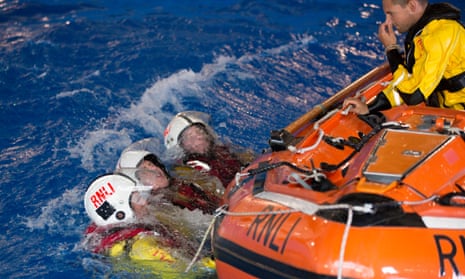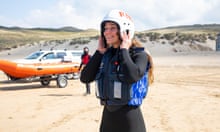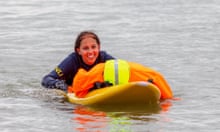The Royal National Lifeboat Institution (RNLI) has been “overwhelmed” by the number of people who have leapt to its defence and dug into their pockets after the charity was criticised in two newspaper articles for its work saving people from drowning abroad.
Rather than being defensive about negative articles in the Times and Mail Online, the RNLI said it was glad of the publicity about its overseas work and hoped the coverage could help it secure a UN resolution on drowning prevention.
The charity’s website has had a month’s worth of traffic in a few days, with many people giving money for the first time.
Kate Eardley, the RNLI’s head of international advocacy, said: “We have been overwhelmed. For us any coverage is a chance to talk about the issue.”
The articles included comments from two Conservative MPs attacking the RNLI for spending 2% of its funds on overseas projects when it was struggling for donations and having to lay off staff.
But Eardley said the charity’s work abroad was central to its mission. “Though 98% of our money is spent in the UK and Ireland, it is central to our values that we want to save lives everywhere,” she said.
“Our overriding purpose is to provide the search and rescue service in the UK and Ireland but we also feel that the scale of global drowning is so big and people don’t know about it.”
An estimated 320,000 people drown across the globe each year and, in many parts of Asia, drowning is a leading killer of children older than one. “It’s a silent epidemic but only a few organisations are trying to do something about global drowning,” Eardley said.
Since the 1970s, RNLI teams have helped out in floods in places such as Bangladesh and Mozambique, but it now focuses on working with local partners to understand who is drowning and how it can be prevented.
Eardley said that as part of its work in Bangladesh – one of the countries highlighted in the Times and Mail Online – the RNLI had realised children were drowning in ponds close to home while their parents were at work, so it helped fund creches to keep them safe.
She said 10,000 children had been kept safe in creches and another 30,000 taught to swim. “It’s like a vaccination. It’s an amazing intervention that really works,” Eardley said.
Since the articles appeared, celebrities including Stephen Fry and Gary Lineker have shown their support for the charity. Eardley told how one of its workers was questioned by locals in a pub in the Lake District. At first they seemed against the overseas work, but the employee won them round and the bar ended up having a whip-round, which raised £79.
The RNLI wants the UN to reach a resolution calling for every country to formally address the issue of drowning, and the controversy has given it a chance to push the subject.
“We’re aware the coverage is not all positive and some people have called to complain or cancel, but this chance to talk about the issue excites us,” Eardley said.










